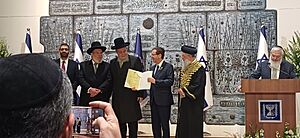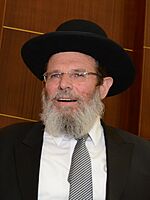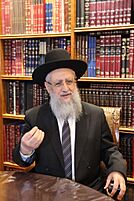Chief Rabbinate of Israel facts for kids
The Chief Rabbinate of Israel (Hebrew: הָרַבָּנוּת הָרָאשִׁית לְיִשְׂרָאֵל, Ha-Rabbanut Ha-Rashit Li-Yisra'el) is the highest Jewish religious authority in Israel. It was created in 1921 when the British ruled the area. Today, it follows the Chief Rabbinate of Israel Law from 1980.
The Chief Rabbinate Council helps the two Chief Rabbis. These two rabbis take turns leading the council. The Rabbinate has the power to organize religious matters for Israeli Jews. It also answers questions about Halakha (Jewish law) from Jewish groups around the world. The Council guides and oversees other religious agencies.
The Chief Rabbinate of Israel has two main leaders. One is an Ashkenazi rabbi, and the other is a Sephardi rabbi. The Sephardi rabbi is also known as the Rishon leZion. These Chief Rabbis are chosen for 10-year terms. The current Sephardi Chief Rabbi is David Yosef. The Ashkenazi Chief Rabbi is Kalman Ber. Both started their terms in 2024.
The Rabbinate oversees many parts of Jewish life in Israel. This includes rules for Jewish marriages and Jewish divorce. It also covers Jewish burials and conversion to Judaism. The Rabbinate handles kosher laws and kosher certification. It helps Jewish immigrants to Israel (olim). It also supervises Jewish holy sites. The Rabbinate works with ritual baths (mikvaot) and yeshivas. It also oversees Rabbinical courts in Israel.

The Rabbinical courts are part of Israel's legal system. They are managed by the Ministry of Religious Services. These courts have special power over Jewish marriage and divorce. They also share power with district courts on matters like personal status, child support, and inheritance. Police and other agencies help carry out the decisions made by these religious courts.
In 2024, the High Court of Justice decided something important. It ruled that women can serve on the Chief Rabbinate Council. They can also serve as rabbis in the Chief Rabbi Election Assembly.
The main office of the Chief Rabbinate is in the Beit Yahav building. It is located at 80 Yirmiyahu Street in Jerusalem. The building where the institution used to be, called Heichal Shlomo, has been a museum since 1992.
Contents
History of the Rabbinate
In Israel, religious and personal matters are handled by the religious leaders of different groups. These groups include Jewish, Muslim, and Druze communities. There are also ten official Christian communities. This system is based on the Millet system from the old Ottoman Empire.
In the early 1600s, the Chief Rabbi of Jerusalem was given the title Rishon LeZion. By 1842, this title was combined with another important position. This was the "Hakham Bashi", who was the Chief Rabbi of Constantinople. He represented Turkish Jews to the Sultan. The Rishon LeZion at that time represented the Old Yishuv (the Jewish community in Palestine) to the Sultan.
On February 24, 1921, a Rabbinical Assembly met in Jerusalem. The British rulers approved this meeting. The Assembly chose a Rabbinical Council for Palestine. Abraham Isaac Kook became the Ashkenazi Chief Rabbi. Jacob Meir became the Sephardi Chief Rabbi. Other rabbis and community leaders also joined the council. The government announced that only this Council and its approved courts would be recognized for Jewish Law. The authority of the Ottoman Hakham Bashi was no longer accepted in Palestine. The legal standing of the Rabbinical Council became clearer in December 1927.
In 1947, David Ben-Gurion and the Orthodox religious parties made an agreement. They decided that personal matters in Israel would continue to be handled by the existing religious authorities. This agreement is called the status quo agreement. It has stayed in place even with many changes in government.
Under this agreement, the system from the British Mandate continued. Being part of the Jewish community meant joining "Knesset Israel," a group Jews could choose to join. There was no big debate then about who was a Jew. Some groups, like Agudath Israel, chose not to register with "Knesset Israel."
In 1953, rabbinical courts were officially set up. These courts gained power over marriages and divorces for all Jews in Israel. This included both citizens and residents. It was also decided that Jewish marriages and divorces in Israel would follow the law of the Torah.
Since 1953, the Rabbinate has only approved religious marriages in Israel. These marriages must follow the Orthodox understanding of halakha. The only exception is that marriages done in other countries are recognized as legal in Israel.
Conversions to Judaism
The State of Israel sees the Chief Rabbinate as the only official body for performing conversions to Judaism in Israel. In the past, conversions were often handled with care. For example, during the time of Ben-Zion Meir Hai Uziel, converts were greatly encouraged. In more recent times, the rules for conversion have become much stricter. Sometimes, the Rabbinate has even canceled conversions. Some rabbis believe this strict control could harm the future of the Jewish people.
There has been a lot of disagreement about how the Chief Rabbis handle conversions. In 2017, it was found that the Chief Rabbinate had a secret list. This list named rabbis and batei din (religious courts) whose conversions it would not accept.
This secret list caused problems because it included respected Orthodox rabbis. It also included non-Orthodox conversion programs, which the Chief Rabbis do not accept. The list was kept secret, so there was no way to check it or appeal decisions. This led to much unhappiness.
Being on this "blacklist" did not stop people from making aliyah (immigrating to Israel). Immigration is controlled by the Law of Return, not the Rabbinate. However, it did affect people's ability to have a recognized marriage in Israel. The situation became more difficult when Haskel Lookstein, an Orthodox rabbi from the United States, was on the list. This stopped some of his students from marrying in Israel. Rabbi Lookstein had overseen Ivanka Trump’s conversion. This caused some tension between Israel and the United States after her father became president. Soon after, the rules were changed, and Trump's conversion was accepted. Still, some wondered if the changes were made just to please the Trump administration.
The process of conversion became a political topic. Ultra-Orthodox allies of the Chief Rabbis in the Knesset tried to pass a law. This law would make the Chief Rabbinate the only government-recognized authority for conversions in Israel.
The Chief Rabbinate also tried to control conversions outside of Israel. In 2016, it tried to create universal rules for conversions for all Jewish communities around the world.
Some rabbis in Israel have pushed back against the Rabbinate's strict rules. Rabbis from Tzohar have created their own way to perform conversions. They are trying to make the process easier for people. By 2018, Tzohar claimed to have converted over 500 children. They also wanted to simplify the process for children born through surrogacy. The Supreme Court of Israel has since said that Tzohar's conversions must be accepted. However, there were attempts in 2017 to pass a law that would overrule the High Court's decision.
Other Orthodox groups also perform conversions outside the Rabbinate. These include efforts by Haim Amsalem and Chuck Davidson. They want to return to the more open traditions of earlier Chief Rabbis like Ben-Zion Meir Hai Uziel. They aim for a more flexible approach that still follows Halakha. They also want to help the over 300,000 Israelis from the former Soviet Union who the Rabbinate does not recognize as Jewish. They also want to address the growing issue of assimilation and intermarriage outside of Israel.
As of 2018, the debate about conversion mainly involves the Orthodox stream. However, Reform and Conservative Jewish groups also want their conversions to be recognized.
In March 2019, it was confirmed that the Chief Rabbinate was using genealogical DNA testing to decide Jewish status. Many religious Zionist and Modern Orthodox groups were very upset by this. They said it went against Jewish law. Rabbi Aaron Leibowitz, who leads Chuppot and Hashgacha Pratit, even called the Chief Rabbinate "racist."
Jewish Marriages in Israel
The State of Israel recognizes any marriage that was legally performed in another country. However, for marriages done inside Israel, only religious marriages are recognized as legal. This means the Chief Rabbinate controls all Jewish marriages. They can also decide if someone is not Jewish, which would stop them from getting legally married in Israel. The Rabbinate and its local religious councils are the only ones who can register rabbis to perform weddings. This gives them a special power over weddings.
Because of the Rabbinate's control, about 400,000 immigrants from the former USSR cannot marry in Israel. Many of these immigrants are Jewish. They often have to travel overseas to get a legally recognized marriage.
However, Israel does have a legal way for people to have civil unions. These unions have the same legal standing as marriage. So, someone who does not marry through the Rabbinate can still have their union recognized by the state. This same system has been used for same-sex unions, even though same-sex marriage is not legal in Israel.
Under Israeli law, a rabbi who performs a marriage outside the Rabbinate can face legal trouble. They could even be jailed for up to two years. Despite this, some people and groups perform marriages outside the Rabbinate's system. Chuck Davidson has openly dared the state to jail him for performing marriages. He has personally performed hundreds of such marriages. His network has performed many more. He works with Hashgacha Pratit, another group that challenges the Rabbinate's control over kosher food and weddings.
Seth Farber started an organization called Itim. Itim still works within the Rabbinate's rules. However, it tries to make the process easier for many non-religious people who want to use their services. Another group involved in marriage within the Rabbinate is the Tzohar network.
Since the Rabbinate is connected to Orthodox Judaism, no Reform or Conservative rabbi can legally perform a wedding in Israel. In July 2018, Conservative rabbi Dov Haiyun was held for performing a wedding that was not approved. This led to protests and criticism from lawmakers and Jewish groups in the United States.
Semikhah: Becoming a Rabbi
The Chief Rabbinate gives semikhah (which means Rabbinic ordination) to people who want to become rabbis. To get this, a candidate must pass six written tests on specific topics. These topics always include Shabbat (the Sabbath), Kashrut (kosher laws), and Family purity (laws about family life). The title given is Yoreh Yoreh. People who get this are also called "Rav Shechuna" (Rabbi of the Neighborhood, בעל כושר לרבנות שכונה). More advanced semachot (ordinations) are given for:
- "Rav Moshav" (Rabbi of the settlement): This needs six exams, with the same required topics as above.
- "Rav Ezori" (Rabbi of the Area): This needs 9 exams.
- "Rav Ir" ([Chief] Rabbi of the City): This needs 11 exams in other areas of Jewish law. These include Orach Chayim, Yoreh De'ah, and Even Ha'ezer. After the written tests, there is an oral exam.
- Dayan: This is for judges in religious courts. It focuses on money laws found in Choshen Mishpat.
The "Rav Ir" and "Dayanut" qualifications are advanced. You can only get them after you have already received the Yoreh Yoreh ordination.
The Chief Rabbinate is not the only place to get rabbinic ordination in Israel. Many other rabbis and groups offer programs, like Rabbi Zalman Nechemia Goldberg's program. However, if someone wants to be employed as a rabbi by the State of Israel, they must have semikhah from the Chief Rabbinate.
See also
 In Spanish: Gran Rabinato de Israel para niños
In Spanish: Gran Rabinato de Israel para niños
 | Dorothy Vaughan |
 | Charles Henry Turner |
 | Hildrus Poindexter |
 | Henry Cecil McBay |



